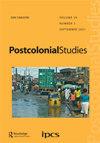The colonial difference in Hugo Grotius: rational man, slavery and Indigenous dispossession
IF 1.8
3区 社会学
Q2 CULTURAL STUDIES
引用次数: 2
Abstract
ABSTRACT (Post)colonial Dutch historiography remains saturated with the myth of the Dutch as benevolent and sometimes even reluctant imperialists geared toward trade rather than settlement. In this article, I seek to unsettle some common presumptions made on the basis of this myth through a re-reading of the work of Dutch lawyer, humanist and state ideologue Hugo Grotius. In particular, I hone in on his writings on slavery and Indigenous (dis)possession to show how colonial and racial violence structure his construction of the free sovereign subject. In doing so, I seek to intervene in existing critical scholarship on Grotius that continues to position the undifferentiated sovereign subject at the heart of his legal thought and positions him as a friend of Indigenous peoples. Applying colonial difference as a lens for reading Grotius’s work, I argue that his legal framework set up the very conditions of possibility for colonial conquest by constructing a Dutch propertied subject as universal.雨果·格劳秀斯的殖民差异:理性人、奴隶制与土著被剥夺
(后)殖民时期的荷兰史学仍然充斥着这样的神话:荷兰人是仁慈的,有时甚至是不情愿的帝国主义者,他们倾向于贸易而不是殖民。在这篇文章中,我试图通过重读荷兰律师、人道主义者和国家理论家雨果·格劳秀斯(Hugo Grotius)的作品,来动摇基于这个神话的一些常见假设。我特别关注他关于奴隶制和土著(非)占有的著作,以展示殖民和种族暴力是如何构建他对自由主权主体的建构的。在这样做的过程中,我试图介入现有的关于格劳秀斯的批判性学术,这些学术继续将无差别的主权主体置于他的法律思想的核心,并将他定位为土著人民的朋友。我将殖民差异作为解读格劳修斯作品的视角,认为他的法律框架通过将荷兰有产权主体构建为普遍性,为殖民征服的可能性创造了条件。
本文章由计算机程序翻译,如有差异,请以英文原文为准。
求助全文
约1分钟内获得全文
求助全文

 求助内容:
求助内容: 应助结果提醒方式:
应助结果提醒方式:


